Brin stared at the microscope in front of her and frowned. She adjusted the lens, brushed her hair to one side and looked again. Her frown deepened, and she turned to glance down at the computer screen to her right. She’d been going over and over the research for days, and now she was so tired she had to check and double-check herself anytime something seemed to deviate. She didn’t know if what she was planning to do would work, but she knew that it had never been more important that she understand a subject so thoroughly and completely.
What she had under the scope was one of the samples from China. She had begun cultures of her own, but the preserved samples that had been operating for the longest had provided the most interesting and relevant data. If she were conducting le-gitimate research, the long-term data would be just as important, but when the entire goal was to just see if the damned process worked, the most mature cells were the ones with the most to offer.
These weren’t acting properly at all. The original culture they’d come from had consisted of cells infected with polio and then treated with the nanoagents. The healthy cells—the control group—had been used to carefully program the agents. She’d seen a dozen studies involving different diseases. Some were viral, some were blood infections, others involved cell degeneration. In every case the programmed agents had infiltrated the maligned cells and began immediate reconstructing. They were able to replicate themselves rapidly, and they locked on to the healthy patterns of whatever host or control cell they were applied to. They were miraculous, potent and the most po-tentially dangerous weapon she could ever imagine.
They could be programmed just as easily to mutate cells as they could to reconstruct them, and when they entered battle with healthy cells, their infiltration was even quicker and more deadly.
They could defeat a human immune system in a frighteningly short period of time—or they could strengthen it against a particular disease to the point of immunity.
Now she had encountered something new. It had been nearly a week since the sample she’d created on the slide in front of her had been exposed to the nanoagents. None of the research that had accompanied the samples stretched more than a week or two in length. It generally took a matter of hours for the agents to reprogram damaged cells and reconstruct their healthy state.
The Chinese researchers had chosen to run through a large range of damaged cells, record the results up until the point a healthy state was restored and then move on.
Now something new was happening. The cells on the slide had changed. They were no longer healthy cells, though they also showed no sign of the polio they’d been infected with. She put her eye to the lens again and concentrated. The cellular structure had shifted. At first glance it seemed as if there was a new infection of some sort—as if a contaminant had been introduced. Then she saw the truth. The nanoagents had not been content to reconstruct the healthy cells. When their work was done, rather than shutting down or remaining dormant, as the research seemed to indicate, they’d changed their programming.
The changes were subtle but significant. The outer cell walls had strengthened, lowering the in-stances of combination. Growth was steady, but the overall cohesion of the sample had suffered. Individual cells with minuscule differences in their makeup had set themselves apart, like small for-tresses, and whenever two came too close, the nanoagents in each, programmed with a slightly different model of perfection, collided and began tiny wars for dominance.
Brin stared at the sample on the slide for a few moments, jotted some notes and then pulled it out.
She quickly went through a number of other samples, all from the long-term cultures provided by the Chinese. It didn’t happen in every case.
Some of the samples were fine, despite being even slightly older than the polio slide, but others were worse. The cellular structure in a few had been de-molished and an entirely new cellular life-form had begun to emerge.
Brin carefully replaced all of the samples and sat down at her computer. She entered the data for what she’d just seen. She had a cell-modeling program that had been preloaded with all the traits of healthy cells of each type involved in the research. When she entered the traits she recorded each day from her samples she got a timeline of reconstruction. The program created a model of the cell as it was at each checkpoint, mapped the changes that had already been made and mapped those that needed to be completed before the cells reached their original healthy state.
In most cases, it took less than thirty-six hours for the cells to regenerate. Most of the case studies had been shut down at twelve days, making that the control. In biomedical research, that was an incredibly short window and wholly inadequate for results leading to the opportunity to test a new treatment on human subjects. That was why she’d begun her own research on the original samples provided. She’d foolishly believed curing disease was what it was all about. What had really mattered to Rand, and to MRIS, was cutting down the amount of time the nanoagents needed to complete their work.
What she’d just seen changed everything, or at least it should have. Though the nanoagents still appeared to be effective in most of the samples, the few that had mutated and gone on to cause irre-parable damage sent huge red flags of warning shooting through her brain. She hadn’t recognized the cells the mutated polio culture had created.
They would probably just war with one another until they were destroyed, but if one cell proved stronger and emerged victorious, what would they have created? Would it stop there? If they set loose what they thought was a controlled biological weapon, could it mutate into something that ran out of control and destroyed life as they knew it?
In any case, she had to let Rand know. It might not matter to him, or to any of them. It had taken a big inner shift, but her view of the world had changed quite a bit over the past few days. She understood that there were men who cared very little for the lives of others, who put personal gain far ahead of human compassion and who saw her work only as a means to an end.
Once she’d finished the reports she sent the output from the cell-modeling software to the color printer in the corner. She had a few minutes to collect her thoughts, and she put them to good use.
One of the containers that had shipped out of China, the largest, was comprised of solely programmed and yet-to-be-programmed nanoagents.
She opened this container and sat it on the bench.
Next she pulled out a very small vial. She placed this vial into a larger tube, about the size of a lipstick container, then took the end result and filled in around it with a special gel used to insulate samples.
Brin wasn’t certain when she was and was not on camera, so she worked quickly, but she tried not to make any sudden or jerky movements. She transferred a small sampling of the nanoagents to the vial, sealed it carefully, sealed the main package and placed it all back on ice. When she turned to put the case away, she slipped the metal tube into the pocket of her lab coat. She didn’t know if she’d been seen, but it was a chance she was willing to take. The scientist in her wouldn’t allow for the complete destruction of valuable research, and that was what was happening. She hadn’t sealed the canister fully, and as she stepped away from the bench, she brushed the temperature controls on the outside of the box. It was only a fleeting touch, but she’d been planning it for hours.
That glancing touch allowed her to spin the dial on the temperature control. It would take a while, maybe longer than she had, but unless something very quickly stabilized the temperature regulation system on the canister, the samples inside would be contaminated. None of the nanoagent cells were programmed to withstand extremes in heat, and she’d adjusted the thermostat to raise the temperature to over one hundred degrees. Most, if not all, of the cultures would die within an hour or two of exposure to that.
Читать дальше
Конец ознакомительного отрывка
Купить книгу










